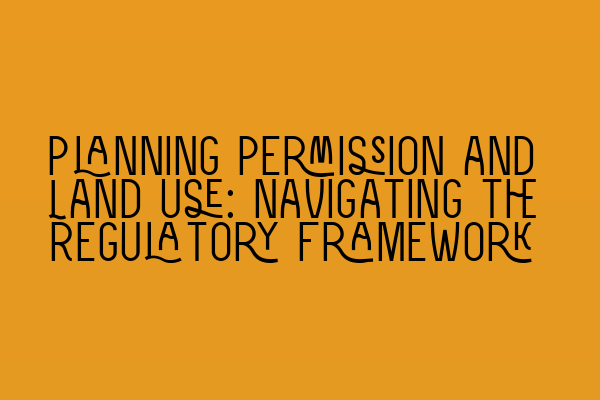Planning Permission and Land Use: Navigating the Regulatory Framework
Welcome to the SQE Property Law & Land Law blog! In today’s post, we will be exploring the intricate world of planning permission and land use. Understanding the regulatory framework surrounding these issues is crucial for anyone involved in property transactions or development projects.
Before we delve into the topic, let’s define planning permission and land use. Planning permission is the legal approval required from the local planning authority to build, extend, or change the use of a property. Land use refers to how the land is utilized, whether it is for residential, commercial, agricultural, or industrial purposes.
Obtaining planning permission is a complex process that involves navigating various laws, regulations, and policies. It is essential to have a thorough understanding of the relevant legal provisions in order to successfully secure planning permission for your development project.
In the United Kingdom, planning permission is governed by legislation such as the Town and Country Planning Act 1990 and the Planning (Listed Buildings and Conservation Areas) Act 1990. These acts, along with associated regulations, set out the framework within which planning decisions are made.
There are several factors that need to be considered when applying for planning permission. These include the impact on the surrounding area, compliance with local and national planning policies, and the viability of the proposed development. It is important to conduct a thorough assessment of these factors before submitting a planning application.
To enhance your understanding of contractual capacity, rights, and limitations, we recommend reading our related article on “Understanding Contractual Capacity: Rights and Limitations.” This article provides valuable insights into the legal principles surrounding contractual capacity and will deepen your understanding of the legal framework.
In order to navigate the planning process successfully, it is advisable to seek professional advice from a solicitor who specializes in property law. A solicitor can assist in preparing and submitting the planning application, ensuring compliance with relevant regulations, and representing your interests before the local planning authority.
To test your knowledge of contract law, take a look at our interactive SQE mock tests. These tests are designed to challenge your understanding of contract law principles and provide an opportunity for self-assessment. Access our “Interactive SQE Mock Tests for Contract Law: Test Your Knowledge” article to discover this valuable resource.
Alternatively, you may find it beneficial to attend our SQE Contract Law webinars. Led by experts in the field, these webinars offer insights and guidance on various aspects of contract law. Join us for our upcoming webinars and expand your knowledge through expert insights and guidance. Learn more by visiting our article on “Join Our SQE Contract Law Webinars: Expert Insights and Guidance.”
It’s also worth noting that the regulatory framework surrounding planning permission and land use is constantly evolving. Changes in legislation and policy can significantly impact the planning process and the viability of development projects. Stay informed about the latest developments by reading our article on “Contract Law Reforms: An Analysis of Recent Changes.”
Another crucial aspect of navigating the regulatory framework is understanding the rights and responsibilities of parties involved in a contract. Discover the rights and responsibilities of parties in a contract by reading our related article on “Parties in a Contract: Rights and Responsibilities.”
In conclusion, planning permission and land use are complex issues that require sound knowledge of the regulatory framework. The legal provisions surrounding planning permission and land use are extensive, making it necessary to seek professional advice when dealing with these matters. By understanding the regulatory framework and staying informed about the latest developments, you can effectively navigate the planning process and ensure compliance with the law.
We hope this blog post has provided you with valuable insights into planning permission and land use. If you have any further questions or require legal assistance regarding property law and land law matters, please do not hesitate to contact SQE Property Law & Land Law. Our team of qualified solicitors is here to provide expert advice and guidance tailored to your specific needs.
